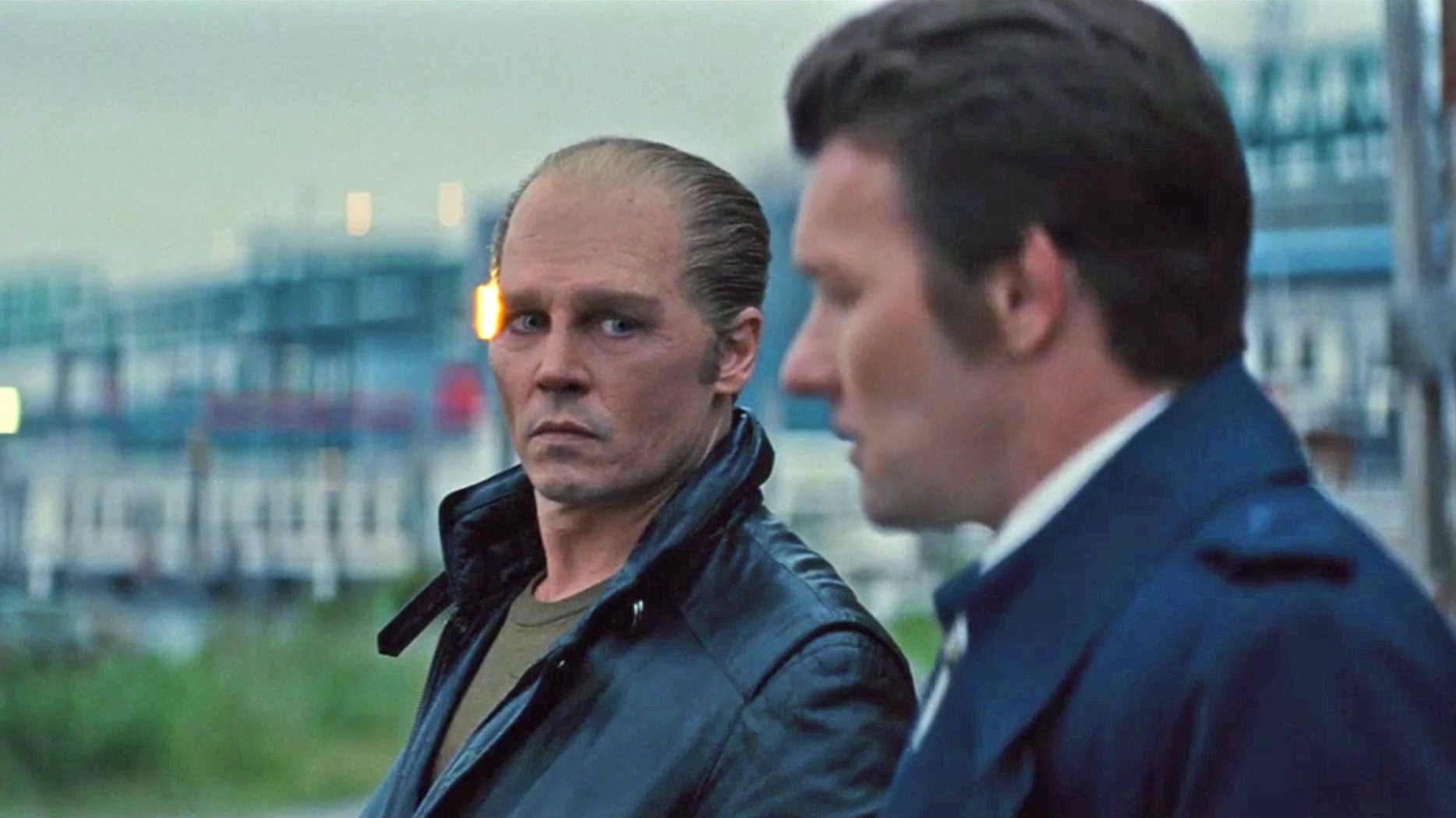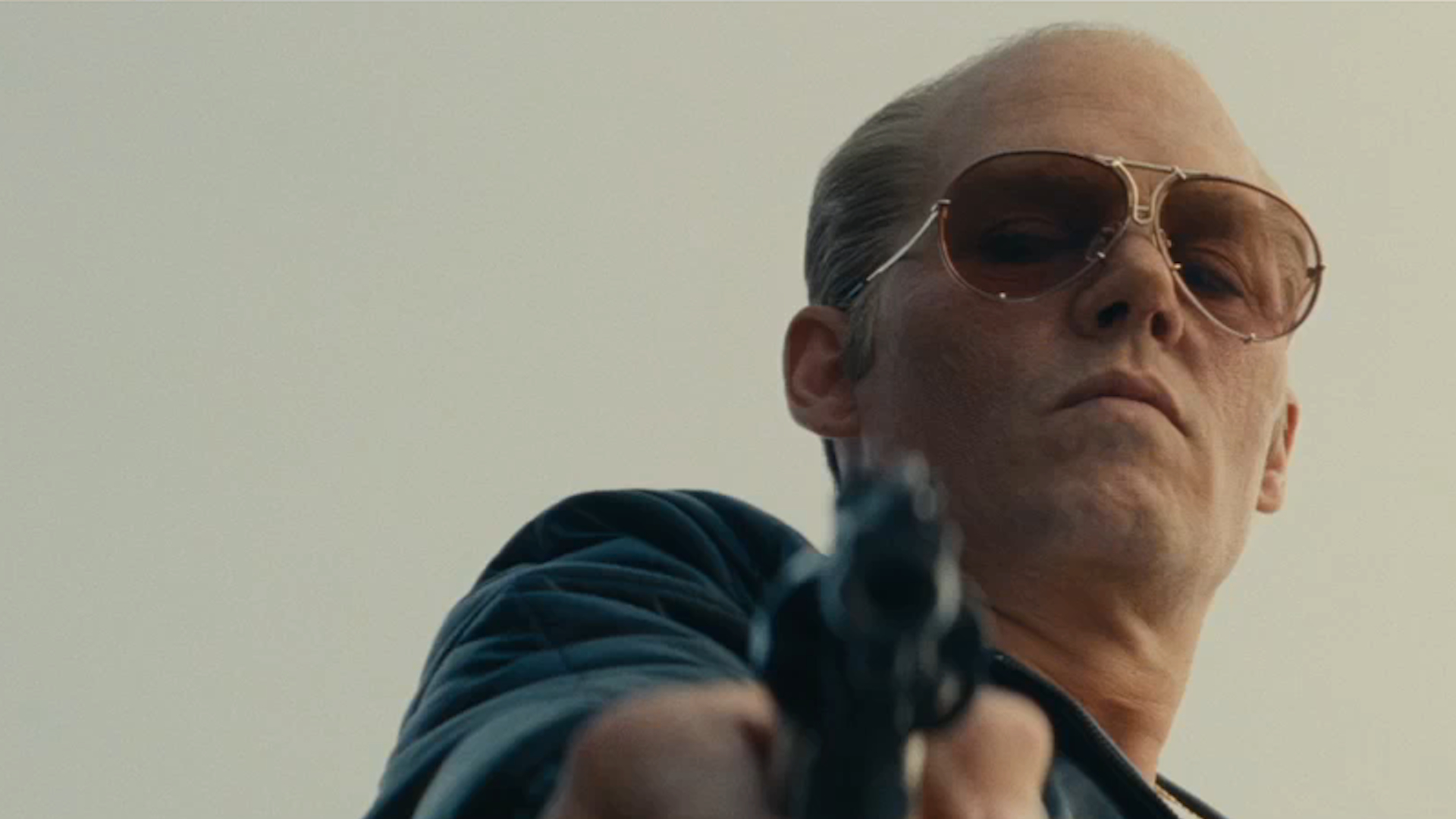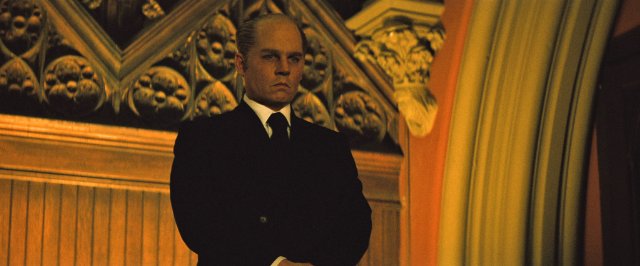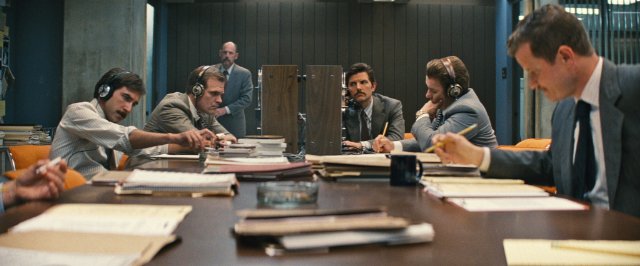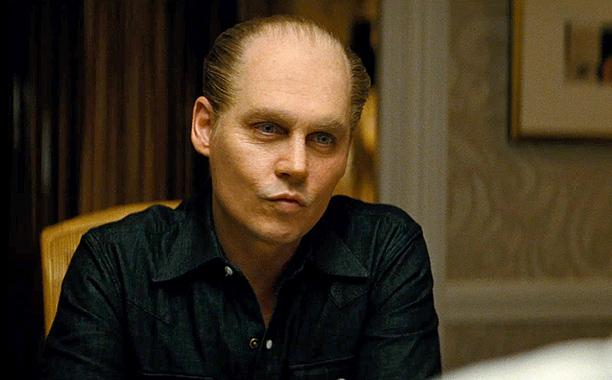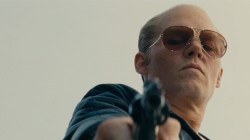 Warner Bros.
Warner Bros.This is a film about a real-life notorious gangster—Jimmy “Whitey” Bulger—but its title (also the title of the book on which the film is based) betrays its subject. A “black mass” is an inverted Catholic mass, a ritual with likely apocryphal roots in the medieval era that is now occasionally practiced to more or less ridicule Christianity.
Besides a glimpse of a funeral, there is no actual mass in Black Mass, though there’s a lot of crosses hanging on walls. But the meaning is well taken: in Bulger’s story, the good guys protect the bad guys and, as FBI Agent John Connolly (Joel Edgerton) puts it, sometimes it’s hard to tell who’s the cop and who’s the robber. The ritual of justice has been inverted, and through an insidious, uncanny hold of one soul on another.
The story itself is well-known to anyone who (like myself) has roots in south Boston; as my uncles have told me, everybody has a Whitey Bulger story. (And yes, they’ve told me theirs.) Bulger, played by Johnny Depp wearing unsettling blue contacts, spent almost a decade in prison (including Alcatraz) in the 1960s and 70s. Upon his release, he returned to Southie as a small-time regional gangster and leader of the Winter Hill gang. When Connolly is called in by the FBI to take down the North Boston mob, sworn enemies of the Winter Hill group, he convinces Bulger—who hates and brutally murders informants and snitches—to act as an informant for the FBI in order to help him out. In return, Bulger gets protected, and with that shield, he becomes a crime kingpin, while Connolly starts running into trouble at the Bureau.
 Warner Bros.
Warner Bros.Director Scott Cooper, who made the very fine Crazy Heart and Out of the Furnace, exerts a strong hand on the look and feel of the film, which seems at once stylish and damp. Even scenes in broad daylight have the sun’s glow sucked out of them, and the chilly water surrounding Boston features prominently in backgrounds, probably because the Winter Hill gang liked dumping bodies near it.
Cooper’s direction nudges the film into strange but potentially effective territory, in keeping with its Satanic title: Bulger comes off as a vampire, and not just because of the creepy contacts. He stands off to the side in every social, from a Miami nightclub to his mother’s funeral, and he’s shot by cinematographer Masanobu Takayanagi (Warrior, Out of the Furnace, Spotlight) from below, as if he’s hovering just a tad, always with his arms crossed. There are crucifixes everywhere (this is Irish Boston), but the only time Bulger willingly gets near any is when he’s waiting in a church for his enemies to be taken care of. As the film progresses and Bulger’s depravity increases, so does the link: in what might be the film’s most tense scene, he strokes the face of Connolly’s wife Marianne in a disturbing inversion of a seductive act that might lead to strangulation, while she looks like she’s going to faint from terror.
 Warner Bros.
Warner Bros.Later, we get the dead giveaway: Bulger laying on his couch, arms crossed, for all the world a man peacefully laying awake in his own coffin—later echoed in a shot of Connolly. That’s the point here. Bulger doesn’t just wantonly murder anyone who dares double-cross him, or even suggest he might. Once Bulger, a polite non-drinker beloved of the old ladies in town, sinks his fangs into Connolly, the good guy turns into a bad one, from light to dark, living to dead inside. You can barely see it happen, but it sure does.
All that is terribly interesting, but the screenplay itself is another story. Co-writer Jez Butterworth has some complicated and virtuosic writing to his credit, including Edge of Tomorrow, so it’s curious that this one lacks both empathy for its characters and anything to rachet up the suspense at all, other than bracing yourself when you realize that guy is about to die too. We know from the start how it’s going to end (and only partly because it’s a true story). Nothing happens to throw a wrench in our expectations, and even scenes that could show the human side of anyone—particularly Bulger—wind up just showing us that he really is a Very Bad Dude.
 Warner Bros.
Warner Bros.That means that as a historical document, the movie is strong, but as a story it limps, leaving us cold at the end. What keeps it interesting is the casting. You really never know who will show up on screen. Besides Depp—and believe the hype, he’s terrific in this, in ways we haven’t seen in a long time—we have Edgerton; Benedict Cumberbatch as Bulger's brother, the senator Billy Bulger; Corey Stoll as the “bulldog” district attorney; Dakota Johnson as the mother of Bulger’s child; Kevin Bacon, a mustachioed Adam Scott, and David Harbour as FBI agents; Julianne Nicholson as Connolly’s wife; and Peter Sarsgaard as a fantastically twitchy associate, plus an assortment of character actors as various Irish mobsters, small-time crooks, and Southie residents. It’s an embarrassment of riches that provides the interest the screenplay itself lacks.
Bulger’s story has been told on screen before, most notably in Martin Scorsese's Oscar-winning film The Departed, itself a remake of Hong Kong gangster movie Infernal Affairs. In that movie, Jack Nicholson plays mobster Frank Costello, whom the filmmakers freely admit on the commentary was based on Bulger. The Departed also has divided loyalties and good cops gone bad, and it’s tense, thrilling, and brutal. It’s also a better movie than this one, because it both gives us insight into motivations—as Black Mass does—and also lets us empathize with them as people.
 Warner Bros.
Warner Bros.That’s important, because there’s really very little point to just reiterating a story so that we know it happened. What’s interesting in Black Mass—the idea of evil’s slow creep, or the tricky dance between law enforcement and the lawless, or an exploration of loyalty, or the characters and texture of the place—gets lost in the morass. It’s not a bad film, but it could have been much better.
Caveat Spectator
This is a film about a notorious gangster from Southie. So alongside the Irish jokes and the Bawston accents, you get exactly what you'd expect: a ton of violence, some of it pretty disturbing—lots of people shot in the head with blood spatters on the windshield, several strangulations, several brutal beatings and fistfights, a lot of blood. To the film’s credit, it could have been far more graphic—quite a bit of it happens just out of frame—and because of this, it would be difficult to call the violence gratuitous, but sometimes your imagination is worse than actually seeing it on screen. There’s also an intense amount of profanity, in keeping with the characters, and some crude sexually-oriented jokes. There’s a little drug use and a fair amount of drinking, and a child dies of an illness.
Alissa Wilkinson is Christianity Today’s chief film critic and an assistant professor of English and humanities at The King’s College in New York City. She tweets @alissamarie.

